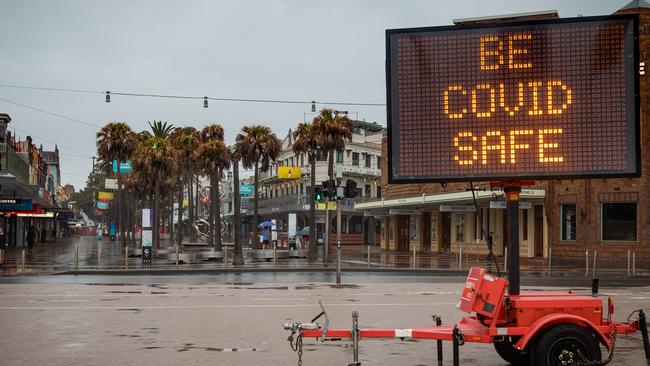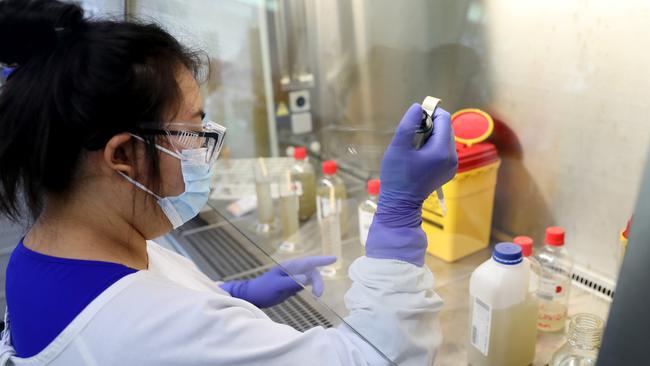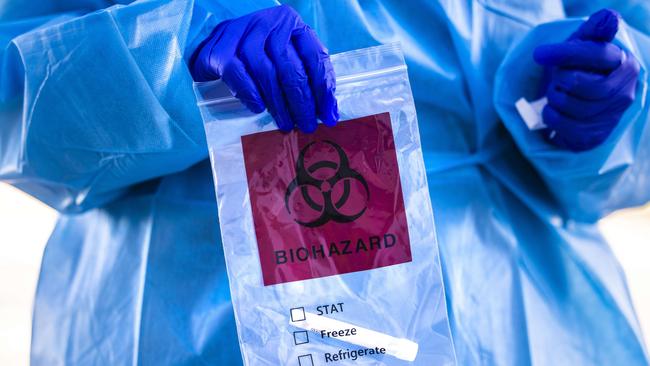Crucial reason to keep mutant COVID variant out of Australia
New mutant virus variants may worry some people, but these COVID experts explain how the vaccine and these daily habits can protect us all.
Coronavirus
Don't miss out on the headlines from Coronavirus. Followed categories will be added to My News.
As the world works to quickly rollout a COVID-19 vaccine, mutant — and sometimes more contagious — strains of the virus have been emerging.
What are these mutant variants and can we be vaccinated against them?
These COVID-19 experts explain how they work and whether we should be worried.

WHAT IS A MUTANT COVID-19 VARIANT?
When a virus, no matter what type it is, spreads it often changes its genomic makeup. It’s been explained in layman’s terms before as like someone making multiple copies of an essay and inserting typos into it.
Deakin University epidemiology chair Professor Catherine Bennett said most of the time these changes were very minor and virus mutation was a game of luck.
“It’s a luck game — either good luck, that it mutates in a way that’s not in favour of the virus or a bad luck, where it works in favour,” she said.
Unfortunately for us the UK variant of COVID has found to be more infectious than the original virus.
HOW MANY VARIANTS ARE THERE?
Every time the virus spreads it essentially is mutating and creating a new variant — and there’s a lot out there, Prof Bennett said.
“The variants have to be sufficiently different — and sometimes there’s a shift in the genomes, and not a shift in the characteristics,” she said. Meaning it might look genetically different but its essentially the same in the way it behaves.
Associate Professor Hassan Vally, of La Trobe University’s Department of Public Health, said there were now three main COVID variants — the UK, South African and Brazilian strains.

ARE THESE VARIANTS MORE ‘CONTAGIOUS’?
Prof Bennett said B.1.1.7 variant wasn’t that much different to the original virus, but had developed new, unfavourable traits.
“It’s seen an accumulation of the nastier mutations in one strain … that are more favourable to the virus,” she said.
“In B.1.1.7, there’s a change in the spike protein which binds to the cells a bit better than the other, meaning its transmissibility is greater.”
Assoc Prof Vally said like most viruses, it’s purpose is to become more spreadable and infectious.
“The virus can survive in our population better if it is easier to spread and causes less severe disease,” Assoc Prof Vally said.
By evolutionary pressures, the virus doesn’t want to die out, it wants to spread to as many people as possible to survive.
HOW IS IT MORE CONTAGIOUS?
For example, if you had original COVID-19 variant and had 100 close contacts — 11 people would become infected.
But if you had either the UK or South African strains, 14-15 people would get it.
“It may just be an extra three or four more people, but if we don’t catch their contacts, then it keeps multiplying,” Prof Bennett said.

WILL THE VACCINES WORK AGAINST NEW VARIANTS?
Yes, but possibly not as well.
Prof Bennett said vaccines worked to generate an immune response.
“When we get a vaccine it will mount an immune response and the body responds as effectively if it were confronted with the virus,” she said.
The COVID-19 vaccines under development have been created to generate an immune response to the original virus — not the UK or South African variants — which have different characteristics.
But this doesn’t mean the vaccine won’t work.
Assoc Prof Vally said the immune system produced a ‘multifaceted response’ from vaccination and produced many antibodies.
“There is a risk that you may lose some effectiveness, but that doesn’t mean those vaccines don’t work completely. They still work.”
WILL THE CURRENT VACCINES PROTECT ME?
Assoc Prof Vally said people needed to shift their thinking when it came to vaccine efficacy.
“We keep talking about vaccine efficacies and what we are all forgetting are these vaccines are 100 per cent efficacious against serious disease,” he said.
“Even if we were unlucky and did get symptoms, they are only going to be mild.”
“These vaccines are only going to reduce the threat of COVID to just having flu-like symptoms, for almost everyone.”

WILL I ONLY NEED TWO JABS OF THE VACCINE?
As COVID-19 mutates, we may need to receive multiple vaccinations to be protected against the new variants.
“This will not be a ‘one shot and you’re fixed’ situation,” Prof Bennett said.
“No doubt we’ll have to have booster shots. That may be where we are heading.”
WHAT’S NEXT FOR AUSTRALIA?
While the vaccinations weren’t 100 per cent effective in stopping the virus, Prof Bennett said they would at least protect against severe illness and death — and that was most important.
“The vaccine makes outbreak containment more likely and still protects against severe illness and disease,” she said.
“You have to protect against that worst harm, as that’s what will overload the health system.”
“People need to step up and get vaccinated and we’ll be in a much better position.”
Assoc Prof Vally agreed widespread vaccination would reduce the number of community infections.

“As we vaccinate more people, the threat the virus poses in the community starts to come down,” he said.
“If we start by vaccinating all of the people likely to die and have severe illness, and then vaccinate a larger proportion of the people left, if COVID does start to spread again it is not going to kill anyone.”
Assoc Prof Vally doesn’t think we’ll eliminate COVID-19.
“Whether it’s because of the vaccine or natural evolution or it will become less virulent, overtime it will be like getting a flu or a cold, and life will go on,” he said.




